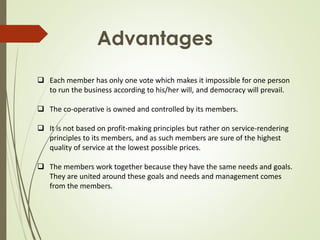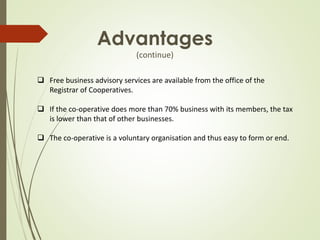A cooperative business organization, also known as a cooperative or co-op, is a type of business structure that is owned and controlled by a group of individuals who work together for mutual benefit. Co-ops can be found in a variety of industries, including agriculture, retail, and finance, and can range in size from small, local organizations to large, multinational corporations.
One major advantage of cooperative business organizations is that they are democratically controlled by their members, who are also the owners of the business. This means that decisions about the direction and operation of the co-op are made by the members themselves, rather than being dictated by outside investors or shareholders. This democratic structure can foster a sense of ownership and involvement among the members, which can lead to increased commitment and motivation to the success of the business.
Another advantage of cooperative business organizations is that they often prioritize the well-being of their members and the community in which they operate. Co-ops may prioritize providing fair wages and benefits to their workers, supporting local suppliers and vendors, and engaging in environmentally sustainable practices. This focus on social and environmental responsibility can appeal to consumers who prioritize ethical and sustainable business practices.
A third advantage of cooperative business organizations is that they can be more resilient to economic downturns and other external challenges. Because co-ops are owned and controlled by their members, they may be less vulnerable to external pressures such as changes in market conditions or the influence of outside investors. This can lead to more stability and security for the business and its members.
However, there are also some disadvantages to cooperative business organizations. One potential disadvantage is that co-ops may face difficulty in obtaining financing and investment, as they may not have the same access to traditional sources of funding as other types of businesses. Co-ops may also struggle to attract and retain top talent, as they may not be able to offer the same level of compensation as larger, more established businesses. Additionally, the democratic structure of co-ops can sometimes lead to slow decision-making and difficulty in reaching consensus among the members.
Overall, cooperative business organizations have both advantages and disadvantages. While they may face challenges in terms of financing and attracting top talent, they offer a unique and potentially more sustainable and responsible business model that is controlled and owned by the members. Whether a cooperative business organization is the right choice for a particular venture will depend on the specific needs and goals of the business and its members.







